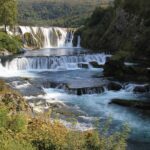The strategy of drawing film crews to Dubrovnik may be working too well according to Bloomberg Business. And we say it’s a case of “damned if we do and damned if we don’t”
As Dubrovnik, and mayor Vlahušić in particular, continue to lure the filming industry to boost the city’s income, Bloomberg Business, on March 23, 2016, takes a look at the effect that growing number of film crews is having on the tourists that find themselves in the city during the filming process.
An article, written by James M. Gomez and Jasmina Kuzmanović, states that film crews for spectacles such as Game of Thrones and most recently Star Wars Episode VIII, crowd out the historic city but then again, if we may add, the promotion received during and after filming is well worth the few weeks of “discomfort”. Here is the article in question.
Star Wars Filming Shows Dark Side for Tourism in Dubrovnik
With Dubrovnik’s medieval promenade choked with floodlights, camera booms and a downed spaceship parked against a stone pillar, Desiree and Roger Hamilton had to dine in a more mundane corner of the 1,400-year-old city.
Walt Disney Co. was filming the eighth installment of the “Star Wars” series in the center of the Croatian port, which also has played King’s Landing in HBO’s “Game of Thrones.” For a week this month, visitors were shunted off the Stradun, the central avenue of stone houses, as stagehands lugged blue crates on cobbled walkways and electricians snaked thick cables past outdoor cafes on the Mediterranean squares.

“The city looks like a stage in Disneyland, and it would be devastating if it becomes just that — a stage,” said Desiree Hamilton, after she and her husband, both Britons living in Pennsylvania, gulped down a bland tourist meal in the cramped bistro. “It’s been spoiled by the movie shooting. It certainly spoils it for tourists who want to see the city.”
As Croatia’s most photographed tourist resort prepares for the summer season, Mayor Andro Vlahusic is pushing the walled city as a living stage for film and television productions. Some city officials, property experts, and locals say that the strategy may be working too well. The very tourists who come because of the films have to fight for lodging and space, threatening to overrun the infrastructure and the local hotel industry.
For Croatia, tourism in cities like Dubrovnik, which was bombed and under siege during the 1991 war for independence from Yugoslavia, will help secure stable economic growth after a six-year-recession ended last year. The European Union’s newest member is betting that western tourists will choose Croatia and its 5,800 kilometers (3,600 miles) of seashore over resorts in the Middle East and northern Africa because of safety concerns.
“You don’t have to set a stage in Croatia, as it has natural beauty, natural history,” Croatian Prime Minister Tihomir Oreskovic said in an interview. “Our role is to further enhance what the country already has to offer and to further elevate global interest in Croatia.”
The city is trying to catch up. Outside the walled-in center, a new electrical substation is beginning operations and a concession has been awarded to develop a cruise-ship port in nearby Gruz. The Belvedere Hotel, owned by Russian billionaire Viktor Vekselberg, is slated for reconstruction, as is the abandoned Kupari bay resort. Both are being developed jointly by Russia’s Avenue Group and the Ritz-Carlton chain.
But that may be too little, too late for a city that is sandwiched between tall scrub hills and the rolling Adriatic Sea. And rooms and apartments rented out by locals living within and outside the thick stone walls can’t meet all the demand.
To read the rest of this article by Bloomberg Business just follow the link








